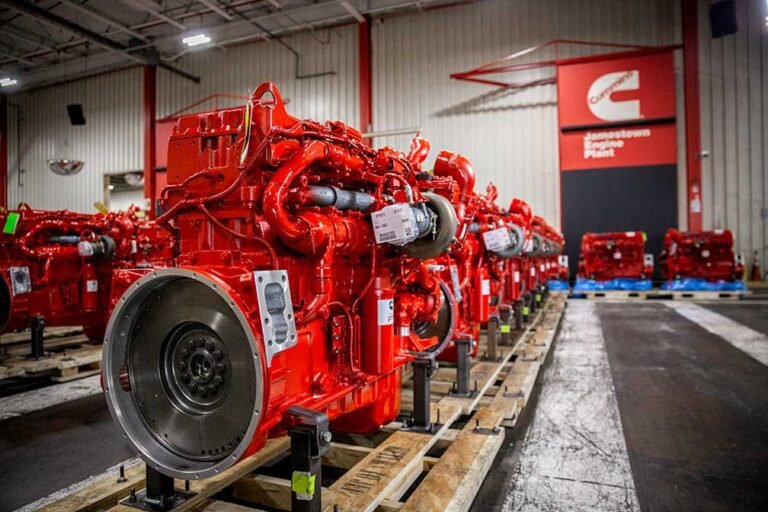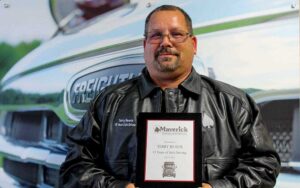COLUMBUS, Ind. — Described by Cummins as the manufacturer’s “most efficient heavy-duty diesel engine ever,” the next-generation X15 was unveiled during an online press event Feb. 29. This newest engine, designed for the heavy-duty on-highway market, is part of Cummins’ HELM 15-liter fuel agnostic platform and will be compliant with EPA and CARB 2027 regulations at launch.
According to Jane Beaman, vice president of global on-highway business at Cummins, “HELM” is a loose acronym for higher efficiency lower emissions multiple fuels. The new platform name “captures the innovation that powers us forward,” she said.
“We have applied our decades of experience with the X15 to our next-generation product and believe these investments will serve our customers well into the future,” said José Samperio, vice president of North America on-highway at Cummins. “The next generation X15 is the next evolution of technology, truly proving to the world that we never stop innovating. We are working hard to ensure the new product delivers our brand promise to customers for the important jobs they need to do every day.”
According to information released by Cummins, the next-gen, advanced diesel X15 engine will feature improved greenhouse gas (GHG) and fuel efficiency benefits while retaining the same ratings of the current X15 (up to 605 hp and 2,050 ft-lb of torque) and optimizing powertrain integration with Eaton Cummins and Cummins-Meritor.
“With higher efficiency, lower emissions, and multiple fuels, the Cummins HELM platforms give our customers control of how they navigate their own journeys as part of the energy transition, Beaman said. “They can choose the fuel types that work best for them, their businesses, and their goals.”
While the new X15 diesel engine can be customized to operate on a variety of fuels, once a unit has been created for a specific fuel it cannot be converted for use with a different fuel, she said.
Cummins is committed to innovation and providing quality solutions to customers, like internal combustion engines and alternative technologies. This next-generation engine is designed to have the capability to meet future emissions regulations beyond 2027 without the need for significant architecture changes. This investment will help the company maintain technology leadership for the next decade as it continues to fund future research and development in hydrogen and alternative fuel engines, battery electric and fuel cell powertrains.
“This new architecture expands on the legacy of the X15 engine. All teams involved recognize how important this product is and what it means for both Cummins and our customers’ future as the base architecture will carry us through the horizon of diesel technology and alternate fuels,” said Jonathon White, vice president of engine business engineering at Cummins.
The next-gen X15 was developed with Cummins’ fully integrated powertrain in mind. The X15 architecture uses a belt-driven, high-output 48-volt alternator and aftertreatment heater solution, optimized for increasingly stringent emission standards.
Customers taking advantage of EX ratings (requires Eaton Cummins Endurant and GPS look-ahead data) with Cummins Meritor axles, brakes and drivelines will experience additional optimized fuel efficiency and drivability through features such as predictive gear shifting, on-ramp boost, and hill roll out, according to White.
Just days before Cummins’ announcement, Hexagon Agility, a provider of renewable natural gas fuels systems announced that it has received new orders for natural gas fuel systems on pilot trucks powers by Cummins’ X15N natural gas engine. The X15N is available on Kenworth and Peterbilt trucks for delivery later this year, and will be available on Freightliner trucks in 2025, according to Cummins.
Even as fleets work to meet increasingly strict emissions regulations through the adoption of battery-electric vehicles, internal combustion engines remain the most viable power source for heavy-duty on-road trucks, according to Cummins.
“Our engines are here for some time,” said Brett Merritt, vice president of on highway engine business at Cummins. “Diesel and natural gas will be the primary propulsion for many years to come.”
For more information about the new X15, which will be produced in Jamestown, New York, click here.
Born in Pine Bluff, Arkansas, and raised in East Texas, John Worthen returned to his home state to attend college in 1998 and decided to make his life in The Natural State. Worthen is a 20-year veteran of the journalism industry and has covered just about every topic there is. He has a passion for writing and telling stories. He has worked as a beat reporter and bureau chief for a statewide newspaper and as managing editor of a regional newspaper in Arkansas. Additionally, Worthen has been a prolific freelance journalist for two decades, and has been published in several travel magazines and on travel websites.











